Introduction
Navigating the financial landscape of clinical trials is a complex endeavor that requires meticulous planning and precision. Clinical trial cost calculators have emerged as indispensable tools in this realm, offering a structured approach to estimating the financial requirements of a study. These calculators enhance budget accuracy, minimize unexpected expenses, and enable more effective allocation of resources.
Such meticulous financial planning not only optimizes fund utilization but also supports improved patient outcomes. With the increasing reliance on technologies like electronic data capture (EDC) and interactive voice response (IVR) systems, which are prevalent in over half of clinical research sites, the burden of managing study volumes and sponsor-provided technology has become significant. Utilizing advanced budgeting tools is essential for navigating these complexities and ensuring that financial aspects are aligned with the overarching goals of clinical research.
Benefits of Using Clinical Trial Cost Calculators
Clinical study cost calculators provide a systematic approach for estimating the financial requirements of a research. These tools allow researchers to improve budget accuracy, reduce unforeseen expenses, and ensure more effective resource allocation. Improved financial planning promotes optimal fund utilization throughout the testing process, thereby supporting better patient outcomes. Significantly, instruments such as electronic information collection (EDC) and interactive voice response (IVR) systems are employed by more than half of research facilities, as shown by Advarra's 2023 Study Activation Survey. These technologies aid in managing the increased study volume and sponsor-provided technology, which has been identified as a significant burden. Utilizing sophisticated budgeting resources is essential for managing the intricacies of contemporary research studies, ensuring that the financial components correspond with the overarching objectives of the investigation.
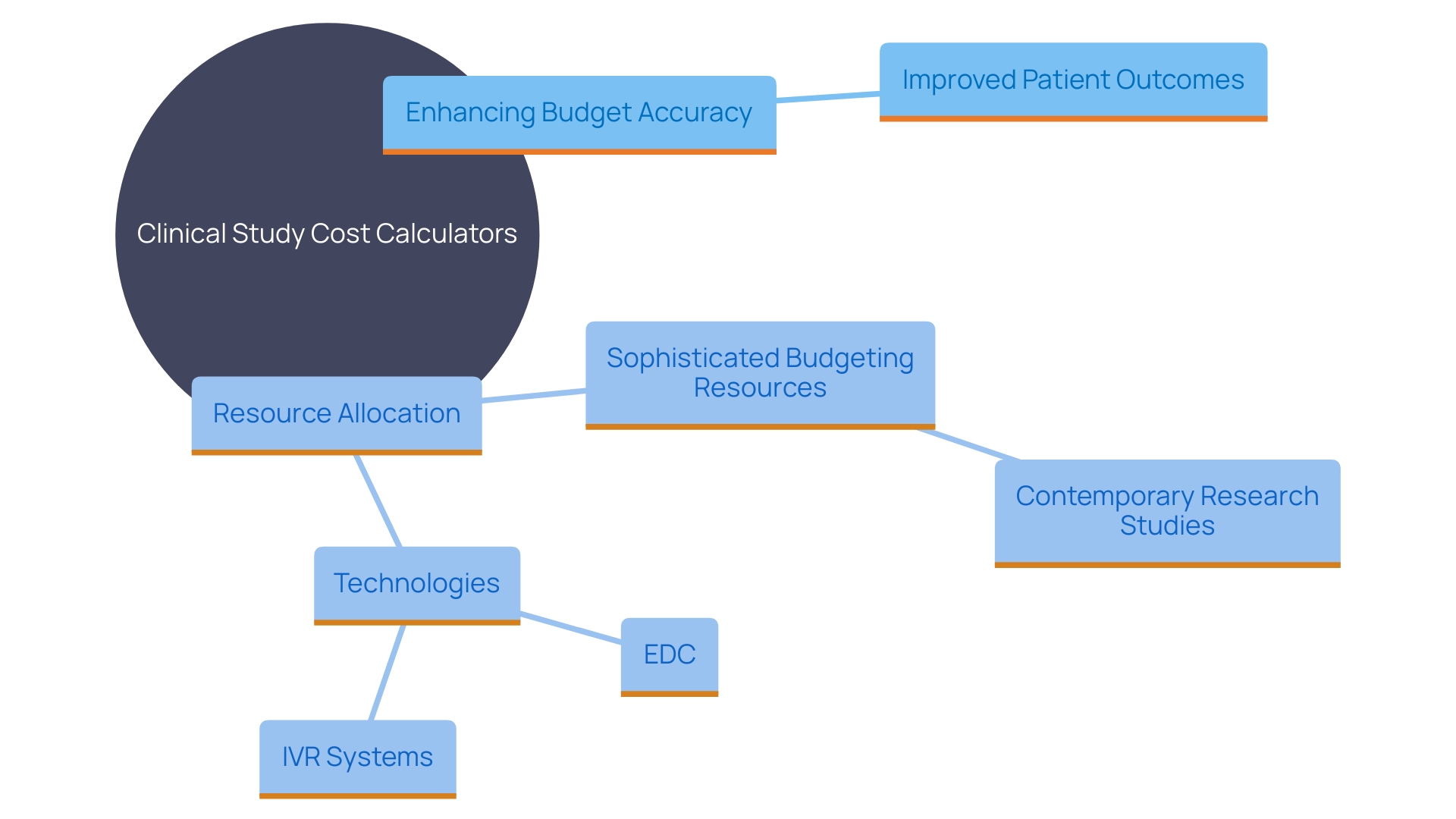
Key Features of Effective Clinical Trial Cost Calculators
A strong research experiment expense estimator should include aspects such as adjustable budgeting templates, immediate information updates, smooth integration with financial systems, and comprehensive expense breakdowns by category. These components are crucial for handling the significant expenses related to medical research, which can be especially challenging in areas such as gene therapy. Recent progress in artificial intelligence (AI) has been crucial in improving the effectiveness of studies by facilitating accurate information management and financial assessment. For example, Veristat succeeded in reducing research database expenses by 30% through the introduction of an advanced clinical information management system.
Moreover, the ability to adjust parameters based on different study designs and phases is crucial. This flexibility enables more precise and customized budget assessments, addressing specific requirements as tests advance. As the industry moves towards patient-centered drug development, the integration of connected devices, wearables, electronic diaries, and other decentralized solutions has become increasingly valuable. These technologies not only enrich data collection but also streamline the budgeting process by providing comprehensive insights from various data points.
By utilizing these advanced functionalities, research project expense estimators can greatly ease the financial and operational difficulties encountered by research teams. This is especially crucial considering that the expenses and intricacies of medical studies keep increasing, requiring more advanced tools to guarantee efficient and effective financial management.
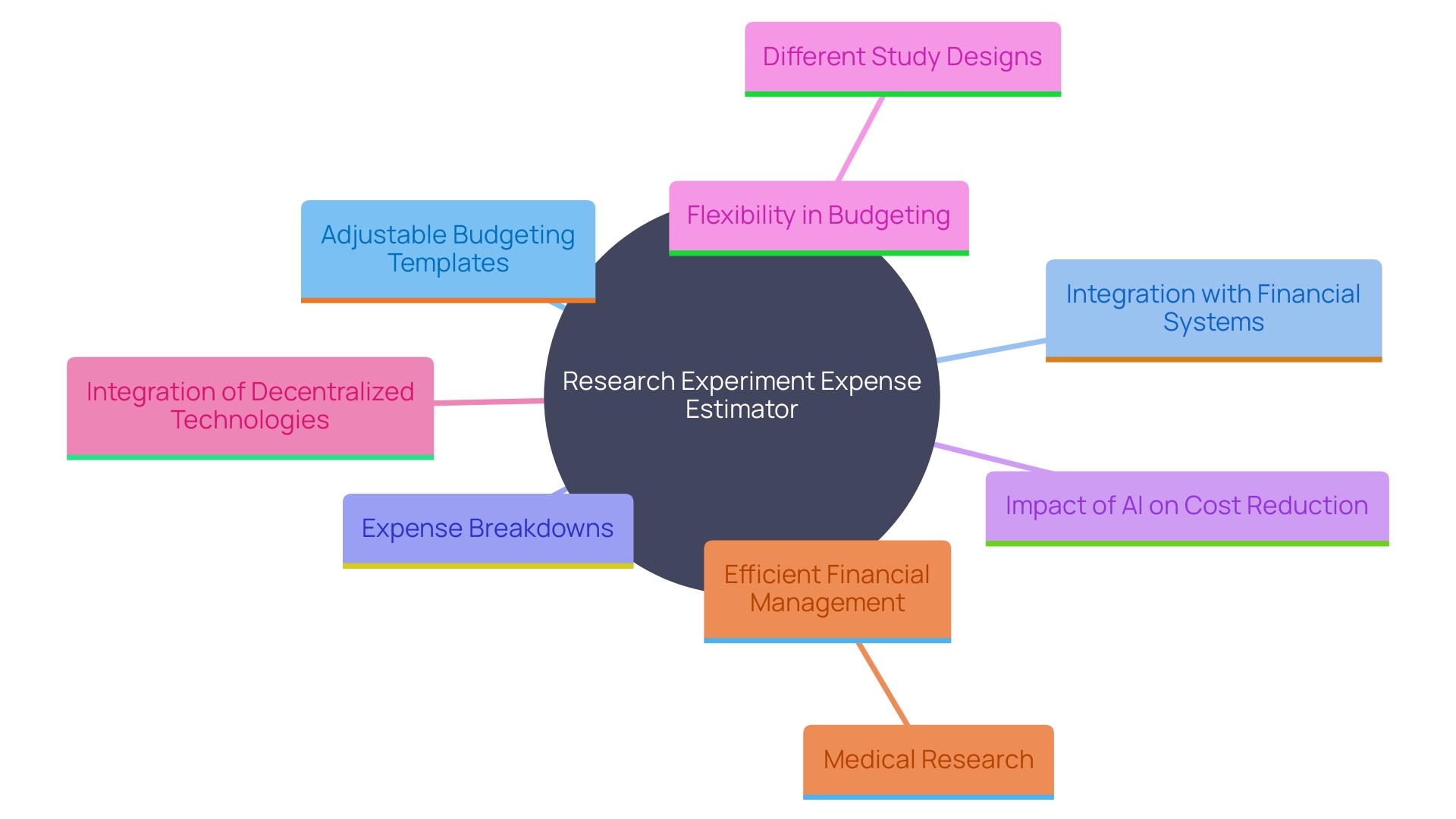
Strategies for Efficient Clinical Trial Budget Management
Applying strong financial management techniques is vital for the success of medical studies. This involves establishing clear financial oversight mechanisms, conducting regular budget reviews, and planning for contingencies. Engaging stakeholders throughout the budgeting process ensures alignment with financial goals and enhances accountability, leading to more effective budget control.
The integration of sustainability initiatives into budget management is increasingly important. For instance, utilizing digital technologies and innovative processes can decrease the environmental footprint of clinical studies while enhancing access and patient experience. 'Transparent reporting and measurement, such as using a Carbon Emission Index, help teams evaluate and optimize the environmental footprint of a project, ensuring sustainability is considered during the budgeting phase.'.
Furthermore, the adoption of advanced AI-driven methodologies enables efficient information gathering and analysis, informing smarter decision-making and optimizing resource allocation. This method not only improves patient safety and information quality but also guarantees the financial effectiveness of clinical studies. Implementing a thorough information strategy prior to protocol design can simplify the budgeting process by precisely predicting expenses and recognizing possible savings.
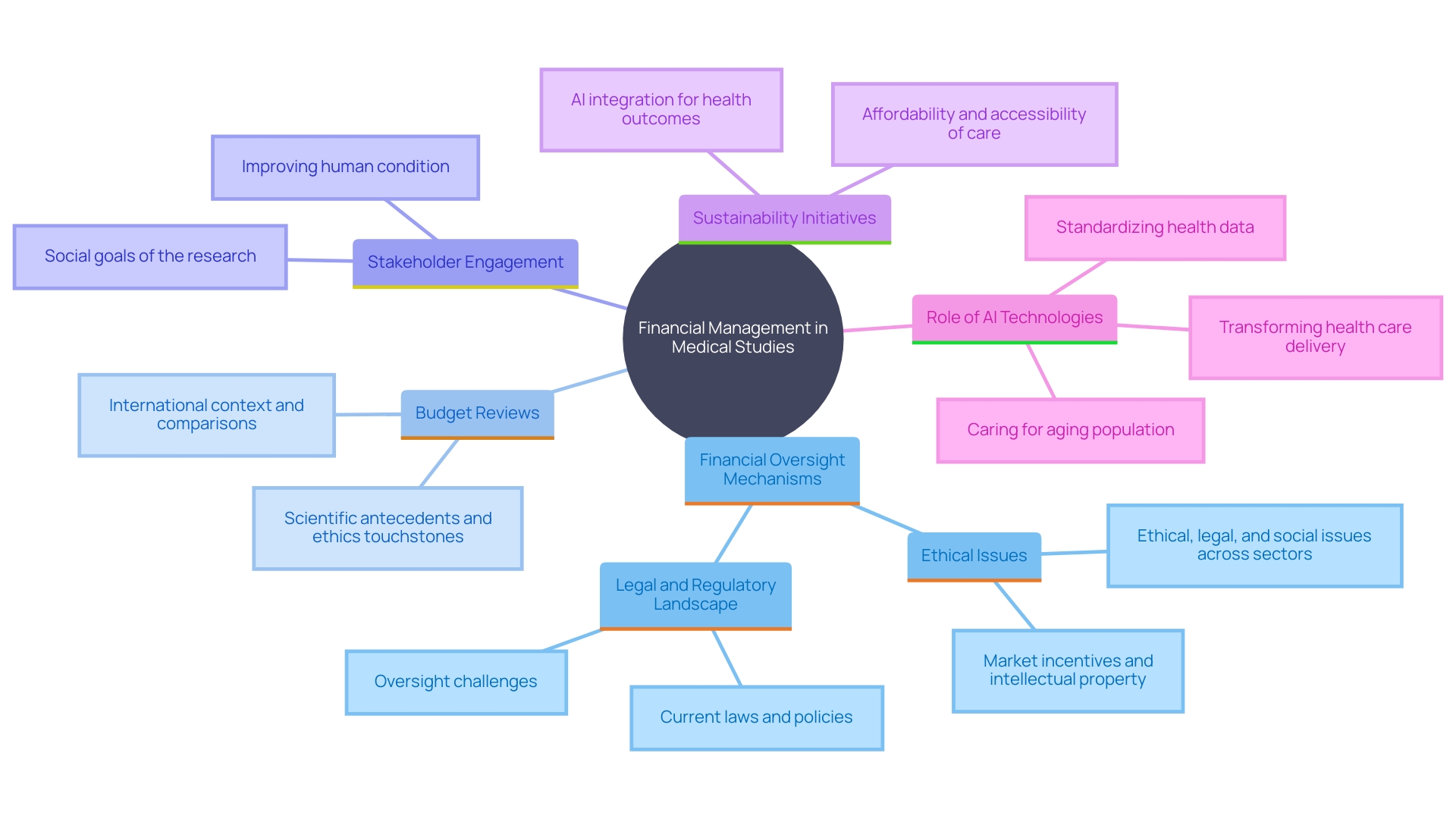
Leveraging Historical Data for Cost Prediction
Employing historical information from earlier trials can greatly improve the precision of financial projections. By analyzing past expenditures, researchers can identify trends and anticipate potential cost fluctuations. This data-driven approach not only aids in creating a more realistic budget but also helps justify funding requests to stakeholders. Recent advancements in information gathering technologies, such as smart implantables and remote patient monitoring, have increased the volume and frequency of available insights, thus enhancing predictive capabilities. As noted by industry experts, these technologies enable earlier detection of issues, which can lead to cost-effective interventions and better outcomes. Furthermore, the expansion of information sharing initiatives by organizations like the NIH has enhanced access to high-quality information, making secondary analysis more feasible and advantageous. This thorough method of data use guarantees that financial planning and expense evaluation in research studies are not only accurate but also in line with the most recent technological and procedural developments.
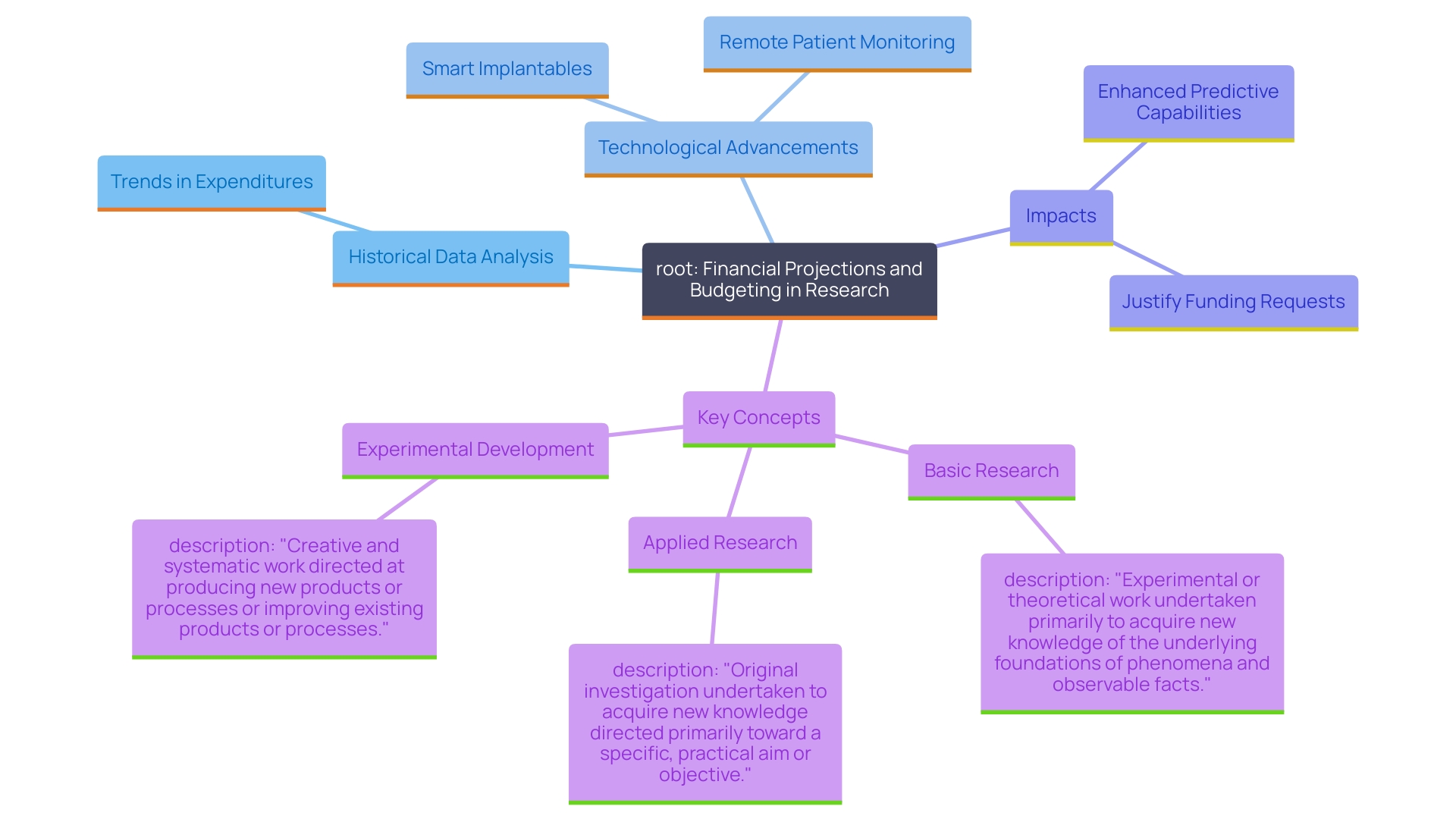
Tracking and Managing Expenses
Efficient expense monitoring is essential for upholding financial integrity throughout the clinical study process. Utilizing a systematic method for documenting expenditures, categorizing costs, and reconciling budgets against actual spending can quickly identify discrepancies. This proactive management approach allows for timely adjustments, ensuring the experiment remains financially viable. Utilizing digital technologies and creative methods, like the establishment of a Carbon Emission Index for environmental impact assessment, additionally enhances transparency and sustainability in research. This dual focus on financial and environmental accountability not only improves budget management but also aligns with broader goals of reducing the healthcare sector's carbon footprint.
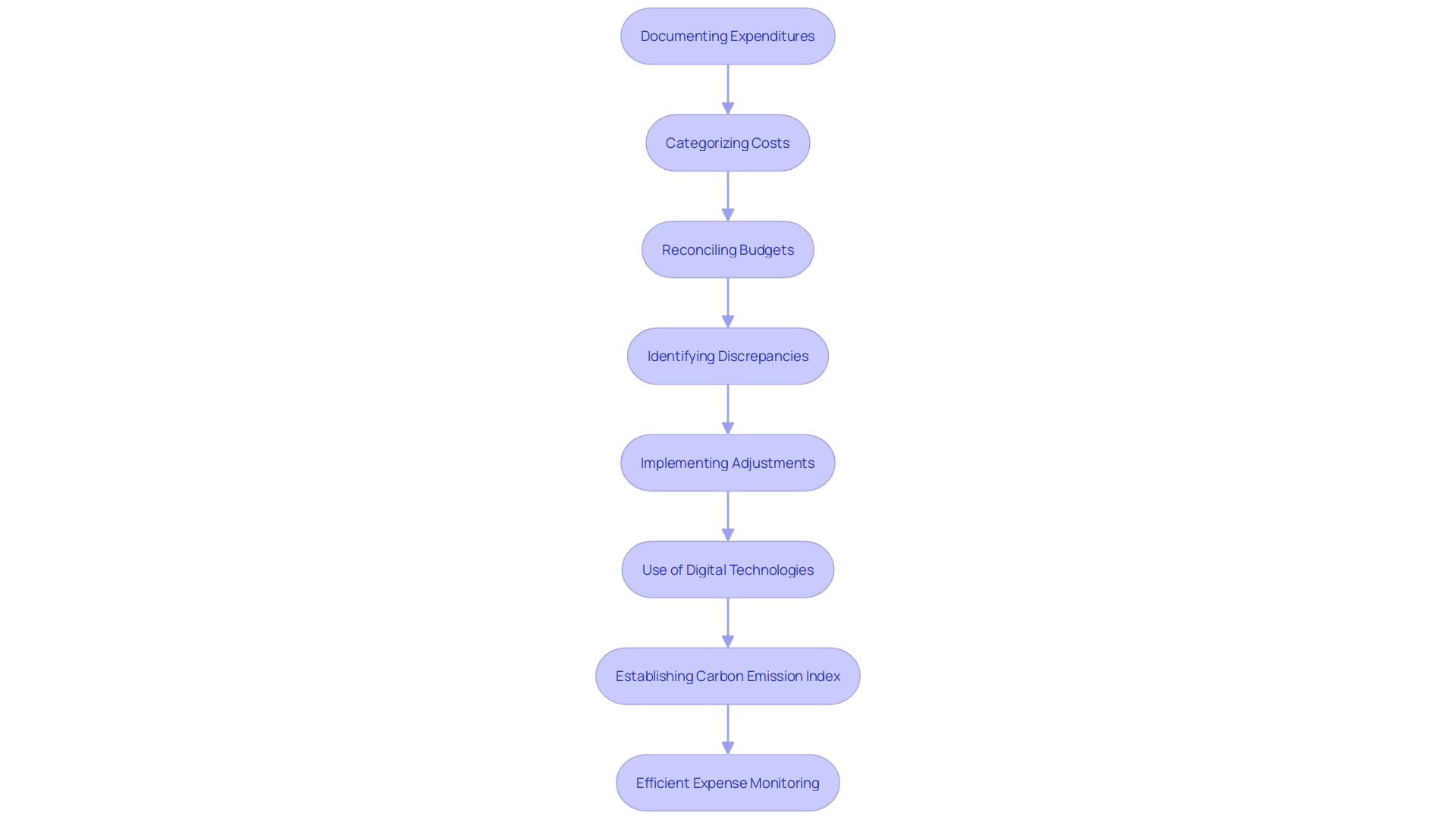
Regular Budget Reviews and Optimization
Frequent budget assessments are essential for identifying areas of overspending or possible cost reductions in research studies. Scheduling these reviews at key milestones ensures alignment with financial goals and allows for timely adjustments. Considering that up to 80 percent of clinical studies do not conclude punctually, ongoing financial enhancement based on real-time information and changing situations is crucial. This approach not only maintains financial control but also enhances the study's overall efficiency. For instance, adaptive study designs, such as those used for testing the bioequivalence of highly variable drugs, demonstrate the value of flexibility in response to changing data. By integrating such adaptive methodologies, researchers can better navigate financial complexities and improve trial outcomes.
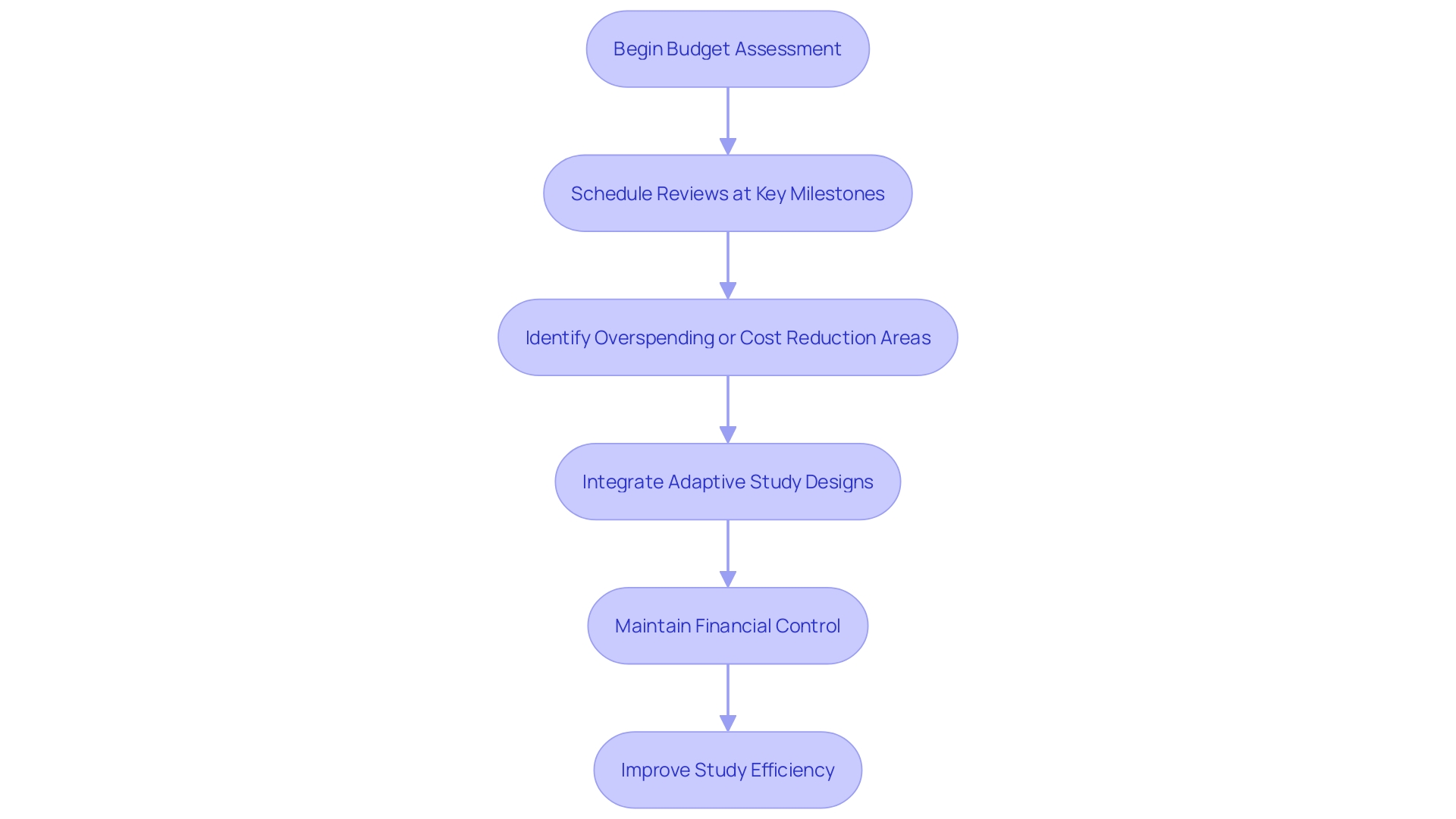
Conclusion
The utilization of clinical trial cost calculators is integral to enhancing the financial management of clinical research. These tools not only streamline budgetary processes but also improve accuracy and reduce unexpected expenses. By incorporating advanced features such as customizable templates and real-time data integration, researchers can ensure that financial planning aligns with the overarching goals of their studies.
The integration of technologies like electronic data capture and artificial intelligence further enhances the efficiency of these calculators, addressing the complexities associated with modern clinical trials.
Effective budget management strategies play a pivotal role in the success of clinical trials. Establishing clear oversight mechanisms, engaging stakeholders, and adopting sustainability initiatives contribute to improved financial accountability. The use of historical data for cost prediction and expense tracking bolsters the ability to forecast budgets accurately, allowing for timely adjustments and better resource allocation.
Regular budget reviews and the implementation of adaptive methodologies enable researchers to respond to changing circumstances, optimizing both financial control and trial outcomes.
In conclusion, the incorporation of robust budgeting tools and strategies is essential for navigating the financial landscape of clinical trials. By leveraging advanced technologies and historical data, researchers can enhance the accuracy and efficiency of their financial planning, ultimately leading to better patient outcomes and the successful completion of clinical studies. As the industry continues to evolve, the emphasis on sophisticated financial management will remain a critical component of effective clinical research.




